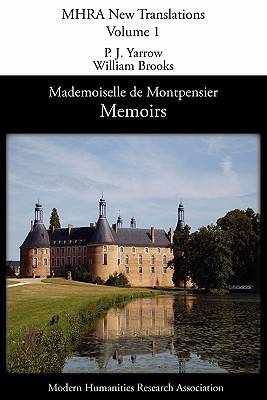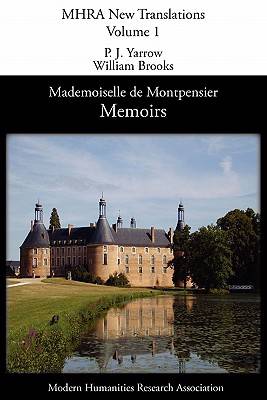
- Afhalen na 1 uur in een winkel met voorraad
- Gratis thuislevering in België vanaf € 30
- Ruim aanbod met 7 miljoen producten
- Afhalen na 1 uur in een winkel met voorraad
- Gratis thuislevering in België vanaf € 30
- Ruim aanbod met 7 miljoen producten
Zoeken
Memoirs of Mademoiselle de Montpensier (La Grande Mademoiselle)
Anne-Marie-Louise Montpensier
Paperback | Engels
€ 20,95
+ 41 punten
Omschrijving
Anne-Marie-Louise, duchesse de Montpensier (1627-1693), known as the Grande Mademoiselle, was the first cousin of Louis XIV. She began working on her memoirs at the age of twenty-five when she was exiled from Paris following her involvement on the 'wrong' side in the Fronde, the civil war that threatened for a time to dislodge the young king from his throne. She returned to them at least twice, each time bringing the story up to date from the point at which she left it so that, in the end, they cover a period of nearly sixty years. They have never been translated satisfactorily into English. Mademoiselle is best remembered for her colourful life, both at court and in exile, including military exploits and a doomed love affair that she recounts with touching honesty even though, at times, we may think her attitudes and her actions naïve. She was the daughter of Gaston d'Orléans (1608-1660), known as 'Monsieur', the troublesome brother of Louis XIII whose gullibility and serial treachery might have been comic had they not had such a damaging effect on the efforts of the Cardinals, Richelieu and Mazarin, to unite France under the Bourbon monarchy and cement the authority of the king. Neither did he love his daughter as she wanted to be loved and as she loved him, for, Anne-Marie-Louise's mother having died within days of her birth, Gaston had married again, and over time, his refreshing new bride was transmuted into a wicked (or at least, scheming) stepmother, while her three daughters by Gaston who lived into adulthood were an irritant, at best, to someone whose consciousness of her own position and self-worth dominated almost her every waking thought. Mademoiselle writes well and engagingly, so that her pen brings Gaston to life in a way that no other author of the period ever equalled, and the same liveliness of description and analysis colours a galaxy of other characters who include Louis XIII and his wife, Anne of Austria, Louis XIV and Queen Maria Theresa, his younger brother Philippe, the second 'Monsieur', the great Condé, victor of so many battles for France (but who also fought for Spain), the two great Cardinals, Christina the Queen of Sweden as she passed through France on her way to Rome, not once but twice, and, above all, the comte de Lauzun, the courtier and soldier who became the love of her life until he, too, was found wanting. She also travelled on numerous occasions around France and to and from her many properties in the provinces, and her personal impressions of the places she saw and the people she met further enrich her account. P. J. Yarrow, Emeritus Professor of French in the University of Newcastle upon Tyne, has selected and translated the most important and characteristic sections of Mademoiselle's enormously long text. His translation has been prepared for publication by William Brooks, Professor of French in the University of Bath and Chair of the British Society for Seventeenth-Century French Studies.
Specificaties
Betrokkenen
- Auteur(s):
- Uitgeverij:
Inhoud
- Aantal bladzijden:
- 282
- Taal:
- Engels
Eigenschappen
- Productcode (EAN):
- 9781907322013
- Verschijningsdatum:
- 10/12/2010
- Uitvoering:
- Paperback
- Formaat:
- Trade paperback (VS)
- Afmetingen:
- 156 mm x 234 mm
- Gewicht:
- 399 g

Alleen bij Standaard Boekhandel
+ 41 punten op je klantenkaart van Standaard Boekhandel
Beoordelingen
We publiceren alleen reviews die voldoen aan de voorwaarden voor reviews. Bekijk onze voorwaarden voor reviews.











